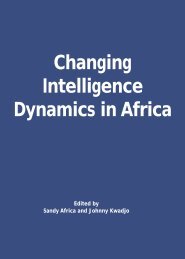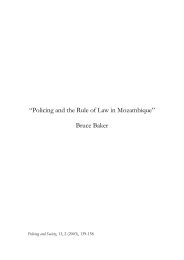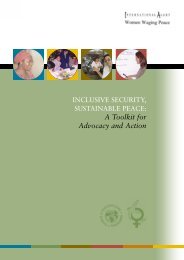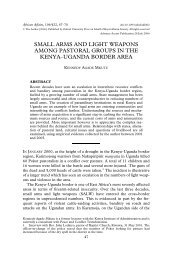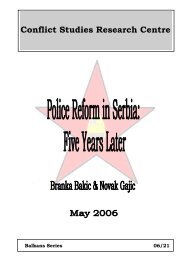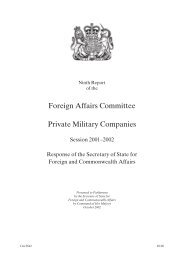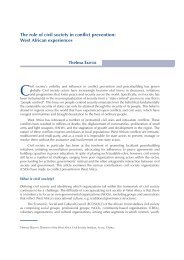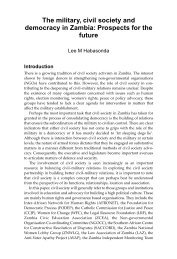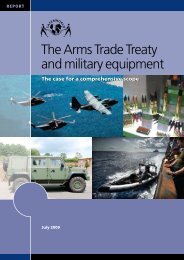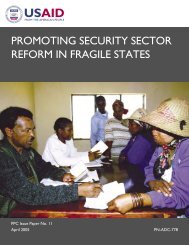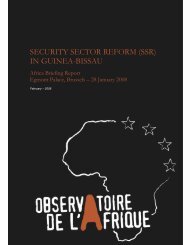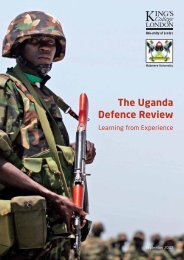AFGHANISTAN'S ELECTION CHALLENGES
AFGHANISTAN'S ELECTION CHALLENGES
AFGHANISTAN'S ELECTION CHALLENGES
Create successful ePaper yourself
Turn your PDF publications into a flip-book with our unique Google optimized e-Paper software.
Afghanistan’s Election Challenges<br />
Crisis Group Asia Report N°171, 24 June 2009 Page 22<br />
records are supplied. 162 The IEC’s ability to oversee<br />
such measures is also uncertain.<br />
There has been little success to date on imposing<br />
financial disclosure requirements on senior government<br />
officials. 163 The constitution requires that the<br />
president, vice presidents, ministers, Supreme Court<br />
justices and the attorney general have their personal<br />
wealth “registered, reviewed and published” before<br />
and after their term; 164 a 2004 presidential decree expanded<br />
the number of posts even further, although<br />
representative bodies are not included. 165 Enforcement<br />
has been patchy. President Karzai publicly declared<br />
his assets – or rather lack of them 166 – but others<br />
do not appear to have done so and the institutions<br />
to receive or check the submissions are weak and<br />
roles not properly clarified.<br />
With income tax requirements in Afghanistan since<br />
2005, candidates should be asked to submit tax returns<br />
in 2010. Public officials and those running for public<br />
position should certainly be expected to prove they<br />
are complying. Such declarations are useful in determining<br />
illegal income.<br />
3. 29Media<br />
The media is essential to reach potential voters, as<br />
Afghanistan is largely rural with poor transport infrastructure<br />
and security concerns make physical cam-<br />
162 Ibid, Article 11.<br />
163 For more detailed analysis see “The Transparency of<br />
Political Wealth”, FEFA, March 2008.<br />
164 Article 154 of the constitution.<br />
165 “This extended such provisions to: “Members of the<br />
cabinet, chief justice and members of the Supreme Court<br />
and other judges, Attorney General and deputies, advisor to<br />
Ministries, Ambassadors, directors and members of the<br />
Independent Commissions, deputy ministers, Commanders<br />
of the military and independent departments, head of the<br />
military forces departments, heads of the police, national<br />
and border security, provincial governors, district governors<br />
and the directors of the civil service departments”. It<br />
demanded that they: “within two weeks of the enforcement<br />
of this decree shall report the complete information on the<br />
specified forms regarding their income, mobile and nonmobile<br />
properties and assets, business activities and loans<br />
for him/herself, spouse, non-adult children to the president’s<br />
office”. Presidential Decree (1) 9 December 2004, as<br />
published in “The Transparency of Political Wealth”, op.<br />
cit., pp. 43- 47.<br />
166 Karzai certified that he had deposited around $10,000 in<br />
a German bank account during the years of war with no<br />
debts, and that he did not own a house, car or land. His<br />
wife’s declared assets were $10,220 worth of jewellery.<br />
“Karzai declares assets to offset corruption smear”,<br />
Reuters, 26 March 2009.<br />
paigning difficult. The media has flourished in recent<br />
years but is often highly polarised with many newspaper<br />
and television channels associated with factions<br />
or powerful individuals. The national broadcaster,<br />
Radio Television Afghanistan (RTA), despite ongoing<br />
efforts to ensure greater independence, has remained a<br />
traditional state broadcaster with the minister of information<br />
and culture closely overseeing everyday operations.<br />
President Karzai refused to sign the new Media<br />
Law passed by the National Assembly in 2008 which,<br />
among other things, sought to transform RTA into a<br />
public broadcaster; currently, as a state broadcaster, it<br />
is widely perceived to be a tool of the government.<br />
The ambiguity over which law is currently in force<br />
has been a source of tension between the executive<br />
and legislature.<br />
The Electoral Law directs that the mass media “publish<br />
and disseminate the platforms, views and goals of the<br />
candidates in a fair and unbiased manner”. 167 However,<br />
IEC regulations are weak on specifics, stating<br />
that private media shall “endeavour to inform and<br />
educate the public on matters relevant to the electoral<br />
process, and shall endeavour to cooperate with the<br />
[Independent Election] Commission and Media<br />
Commission to inform impartially the largest number<br />
of citizens”. 168 The sponsored advertising program, in<br />
which candidates were given television or radio slots<br />
on a selection of public and private channels, was seen<br />
as one of the great successes of the 2005 polls. This<br />
time however there will only be provisions for statefunded<br />
access to media for presidential candidates –<br />
including the broadcast of a number of presidential<br />
roundtables – with a previous bar on paid advertisements<br />
removed.<br />
A temporary five-person Media Commission is established<br />
during each election period. 169 IEC regulations<br />
give it a fairly narrow role in “monitoring the coverage”,<br />
“reviewing complaints” and “providing the [Independent<br />
Election] Commission with information and reports”.<br />
170 There is no provision for enforcement. Indeed,<br />
the electoral media commission is directed to refer any<br />
alleged offences to the permanent media commission<br />
of the ministry of information and culture, 171 which<br />
167 Electoral Law (2005), Article 50.<br />
168 Article 5, “Media Commission Establishment and Mass<br />
Media Activity Regulation”, Independent Election Commission,<br />
2009.<br />
169 The Media Commission is to be established at least 60 days<br />
before the polls. Electoral Law (2005), Article 51.<br />
170 Article 4, “Media Commission Establishment and Mass<br />
Media Activity Regulation”, op. cit.<br />
171 Article 4, “Media Commission Establishment and Mass<br />
Media Activity Regulation”, op. cit.



